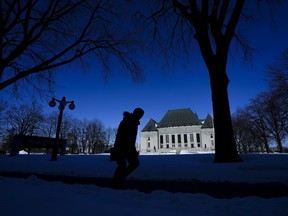The detained Canadians are among many foreigners in ramshackle detention centers run by Kurdish forces.

Article content
OTTAWA – Four Canadian men detained in Syria are asking the Supreme Court of Canada to reconsider their requests for a hearing that could open the door to their freedom.
In November, the high court declined to hear the men’s challenge to a Federal Court of Appeal ruling that said Ottawa is not required by law to repatriate them.
Article content
Following its usual practice, the court did not explain at the time the reasons why it refused to examine the matter.
Advertisement 2
Article content
In a new notice filed with the high court, lawyers for the men say extremely rare circumstances warrant another review of the application for leave to appeal.
The detained Canadians are among many foreigners in ramshackle detention centers run by Kurdish forces who have retaken the war-torn region from the militant group Islamic State of Iraq and the Levant.
Jack Letts, one of the Canadians, became a devout Muslim as a teenager, vacationing in Jordan and then studying in Kuwait before ending up in Syria.
The identities of the other three are not publicly known.
In the original application to the high court, the men’s lawyers said their clients had been arbitrarily detained for several years without charge or trial.
“They are imprisoned in overcrowded and unsanitary conditions, and at least one Canadian is held with 30 other men in a cell built for six people. They lack adequate food and medical care and one of the applicants reported to Canadian government officials that he had been tortured.”
Lawyers said the men’s foreign jailers would release them if Canada made the request and facilitated their repatriation, as it had done for some Canadian women and children.
Article content
Advertisement 3
Article content
In the newly filed notice, the lawyers say there is a “constitutional imperative” for the top court to agree to hear a case when the evidence reveals issues of public importance based on serious violations of basic human rights.
Recent evidence indicates that Canada will not repatriate the men, the notice says. As a result, they are sentenced to “indefinite and arbitrary detention in cruel and life-threatening conditions, in an increasingly dangerous and unstable region.”
The Supreme Court is at the “apex of the Canadian judicial system” and its initial refusal to hear the appeal “constitutes a failure in its supervisory role,” the notice says.
“This is compounded in the international context where the question of a State’s responsibility to assist a vulnerable and seriously distressed citizen is recognized as an evolving area of international human rights law.”
In an affidavit filed with the notice, former Amnesty International Canada Secretary General Alex Neve says the case raises novel and unresolved human rights issues that affect all Canadians and could influence practices in others. countries.
Advertisement 4
Article content
Neve, who was part of a civil society delegation that visited Syrian prison camps last summer, says it has “been frustrating” for advocates seeking clarity from Global Affairs Canada on its position on aid to the remaining detainees.
The four men won one battle in their protracted fight in January 2023, when Federal Court Judge Henry Brown ordered Ottawa to request their repatriation from squalid conditions as soon as possible and provide them with passports or emergency travel documents.
Brown said the men also had the right to have a representative of the federal government travel to Syria to help secure their release once their captors agreed to hand them over.
The Canadian government argued that Brown wrongly conflated citizens’ Charter right to enter Canada with the right to return, effectively creating a new right for citizens to be brought home by the government.
The Federal Court of Appeal agreed, saying the judge’s interpretation “requires the government of Canada to take positive, even risky, steps, including actions abroad,” to facilitate the men’s right to enter Canada.
The appeal judges said that while the government is not constitutionally or otherwise legally obligated to repatriate the men, their ruling “should not be taken to deter the government of Canada from making efforts of its own to achieve that result.”
Article content